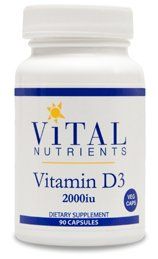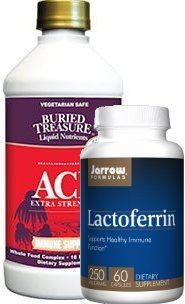
Vitamin D3 2000 IU 90 vcaps
Vitamin D3 is the most easily absorbed form of vitamin D. Research demonstrates that it strengthens the immune system1, protects women against rheumatoid arthritis2, can reduce the severity of asthma3, some research suggests it may protect against developing cancer,4 may be linked to maintaining healthy body weight5, and may have a key role in keeping the brain working well late in life.5
Ingredient per capsule: Vitamin D3 2000iu
(Cholecalciferol from Lanolin)
Other ingredients: Rice powder, Silica.
Suggested use:
1 capsule 5 to 7 times weekly with food or as directed by your healthcare professional.
Warning: If pregnant, consult your physician before taking this or any other product. Keep out of reach of children.
Related Research
Nervous System
Genomic and Nongenomic Signaling Induced by 1a,25(OH)2-Vitamin D3 Promotes the Recovery of Amyloid-ß Phagocytosis by Alzheimer’s Disease Macrophages
2012 research published Journal of Alzheimer's Disease indicated that vitamin D3 may support brain functioning by activating certain genes and cell signaling networks to strengthen up the immune system to help get rid of amyloid plaque.
Study funding included the Alzheimer's Association and NIH.
Is vitamin D important for preserving cognition? A positive correlation of serum 25-hydroxyvitamin D concentration with cognitive function
This study analyzed the relationship of vitamin D with cognitive functioning and the possible mechanisms. It describes the analysis of older adults at a university medical clinic who received consulting assessments for memory problems.
The researchers determined that a significant, positive relationship existed between patients' concentrations of blood serum 25(OH)D and the mini-mental state examination score (MMSE) - suggesting a possible role for vitamin D in cognitive functioning.
Archives of Biochemistry and Biophysics, Volume 460, Issue 2, 15 April 2007, Pages 202-205, Robert J. Przybelski, Neil C. Binkley
Association between 25-hydroxyvitamin D levels and cognitive performance in middle-aged and older European men
Researchers examined the connection between levels of 25-hydroxyvitamin D (25(OH)D) and cognitive functioning in33,369 older and middle-aged European men aged 40–79 years. Their cognitive function was measured using the Rey–Osterrieth Complex Figure test, the Camden Topographical Recognition Memory test and the DSST (Digit Symbol Substitution Test). The scientists found relationships between cognitive functioning capacity and 25(OH)D levels by way of locally weighted and linear regression models.
They found lower 25(OH)D levels were connected to poorer performance on the DSST.
Association between 25-hydroxyvitamin D levels and cognitive performance in middle-aged and older European men J Neurol Neurosurg Psychiatry 2009
Macular Degeneration
Vitamin D and Reduced Risk of Macular Degeneration: 2011 Study
Researchers looked at blood level data of vitamin D among 1,313 women 50 to 79 enrolled in the ongoing Women's Health Initiative study. They found that in those women who were younger than 75, vitamin D from foods and supplements (but not from time spent in direct sunlight) was linked with decreased risk of developing early age-related macular degeneration. Those who consumed the most vitamin D had a 59 percent decreased risk of developing AMD compared with women who consumed the least.
Ref: Vitamin D and Macular Degeneration Arch Ophthalmol. Amy E. Millen, PhD; Rick Voland, PhD; Sherie A. Sondel, MS; Niyati Parekh, PhD; Ronald L. Horst, PhD; Robert B. Wallace, MD; Gregory S. Hageman, PhD; Rick Chappell, PhD; Barbara A. Blodi, MD; Michael L. Klein, MD; Karen M. Gehrs, MD; Gloria E. Sarto.
Low Levels of Vitamin D3 tied to macular degeneration: 2007 Study
Researchers in this study found that low levels of vitamin D3 in the body are connected to an increase in the presence of macular degeneration. Consumption of milk, fish, and vitamin D supplements were assessed. Lower consumption of milk had more risk of early macular degeneration. Patients who consumed less fish had more risk of advanced macular degeneration. Patients who did not drink milk but who took vitamin D supplements had less risk of early macular degeneration.
The researchers concluded that vitamin D likely helps prevent against macular degeneration but that more investigation is needed to verify these results in the future.
Published: Association Between Vitamin D and Age-Related Macular Degeneration in the Third National Health and Nutrition Examination Survey, 1988 Through 1994. Arch Ophthalmol. May 2007;125: 661-669. Researchers: Parekh N, Chappell RJ, Millen AE, Albert DM, Mares JA.
General Immune Response
Vitamin D-Mediated Induction of Innate Immunity in Gingival Epithelial Cellsgingival cells that were treated with Vitamin D displayed an improved ability to produce an endogenous antibiotic that was able to kill more bacteria than untreated cells.
Infection and Immunity, 2011; 79 (6)Footnotes:
1. February 23 Archives of Internal Medicine
2. Dr. Kenneth Saag, University of Alabama, Birmingham, USA., Arthritis and Rheumatism.
3. May, 2012, American Journal of Respiratory and Critical Care Medicine, 600 children in Costa Rica
4. 2012, Cancer Treatment Centers of America, 700+ Cancer patients
5. Study: Medical College of Georgia, of 600 teenagers
| Free 1st Class Shipping | Free 1st Class Shipping |
|---|

